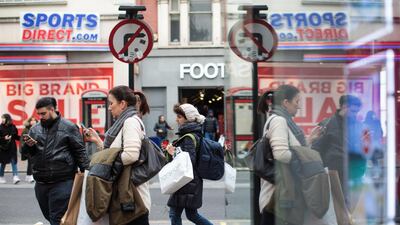The UK economy expanded less than previously estimated in the fourth quarter as consumers and businesses absorbed faster price increases.
Gross domestic product rose 0.4 per cent, compared with an initial estimate of 0.5 per cent, the Office for National Statistics said on Thursday. Offsetting that, the three months to September was revised up to 0.5 per cent. In 2017, growth was 1.7 per cent, the slowest since 2012.
Part of the economy's weakness reflects the fallout from the pound's drop since the vote to leave the European Union in 2016. Household-spending growth slowed in the fourth quarter, leaving its full-year increase at 1.8 per cent, the weakest in five years. But there has also been an upside from the currency move, with a boost to exports. Trade contributed 0.4 percentage point to growth in 2017, the first time it's added to the expansion over a full year since 2011.
____________
Read more:
Britain promises no 'Mad Max style' deregulation after Brexit
May says UK seeks post-Brexit EU security partnership
____________
The merits of depreciation were on debate on Wednesday as Bank of England governor Mark Carney and fellow policy makers took questions at a Parliament committee. Most agreed that devaluations just make people "poorer", a view reflected in consumer behavior and retail sales over the past year.
“Services continued to drive growth at the end of 2017, but with a number of consumer-facing industries slowing, as price rises led to household budgets being squeezed,” said Darren Morgan, head of GDP at the ONS.
Brexit continues to dominate the outlook for the economy, creating uncertainty for companies and consumers that’s holding back demand. Divisions within government aren’t helping the situation, and Prime Minister Theresa May is gathering with her most senior cabinet ministers on Thursday in a bid to end the rift over the EU exit process.
Services - the biggest part of the UK economy - grew 0.6 per cent in the fourth quarter, though downward revisions to components including distribution, hotels and restaurants contributed to the revision in headline GDP. The 1.6 per cent full-year growth was the slowest since 2011. The estimate for industrial production in the fourth quarter was also revised lower.
Even with the economy on a weaker growth path, inflation has taken over as the BOE’s primary concern. It’s currently running at 3 per cent, a full percentage point above the central bank’s target, prompting an interest-rate increase in November. Officials say that more tightening will be needed to keep prices in check, though Carney refused to be drawn on the exact timing of the next hike on Wednesday. Market pricing suggests it could happen as soon as May.

